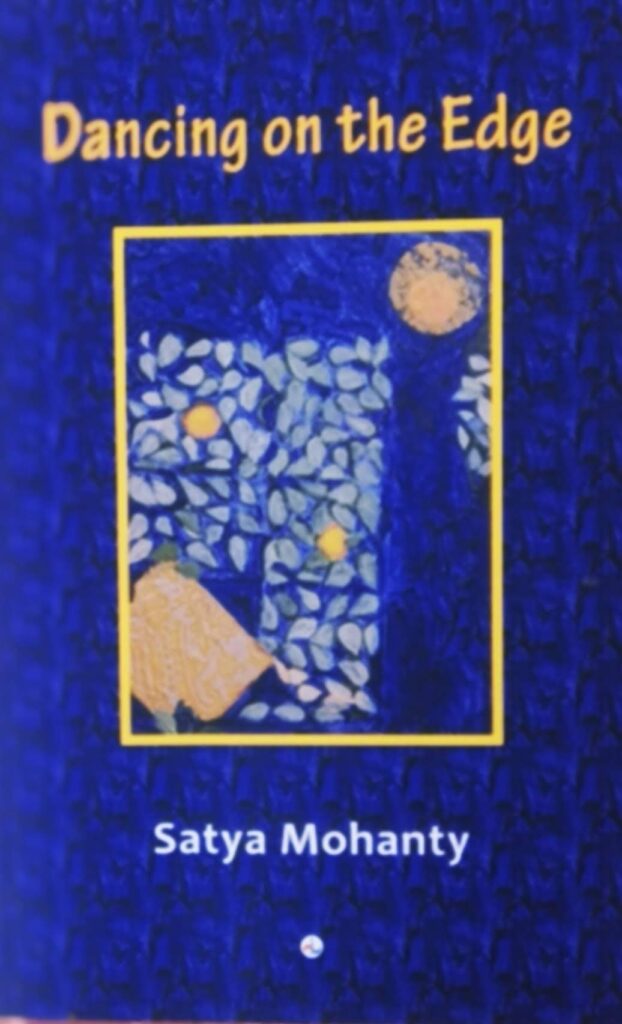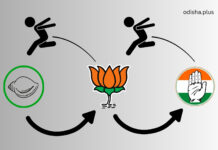Bhaskar Parichha

‘Dancing on the Edge is about persons at war with themselves. It retrieves fragments and episodes from the multiple pasts that we inherit and live in. The unmistakably layered poems, deeply rooted in monolithic and cross-pollinated cultures, create a cultural confluence. They explore belonging and exile, love and betrayal, suffering and realization, hope and soaring ambition. There is a kind of fox-trotting between history and modernity, sadness and hope, earthiness and largeness of historical vision,’ reads the blurb of this maiden poetry collection of Satya Mohanty.
Thirty-plus poems, each with a varied theme and emotion-, the collection captures the essential living and are shaped by culture and traditions. If there are poems on the partition, there’s one on spring. What is noteworthy is Satya Mohanty is a keen observer of all that is happening around. So we have a poem on Weekends, Rendezvous, and Delhi Metropoli and of course a poem on the songs of a civil servant. Take for example this one on one’s own vocation:
‘I am the sentinel of a dying empire,
Dewan of a shrinking sultanate,
Placid but intense like smoldering coal
Mostly conscientious and guardian of knowledge
That is known to all’
(Song of a Bureaucrat)
This observing oneself and intimacy with people, events, and places appear stronger in other poems as well.
‘I don’t hear my native tongue/With its smell of mango blossoms/Intimate, floating and the wild odor of nativity/’I don’t see the friendly bushing shoulders/The wiping of sweat, walk of fond oxen/After the shared diurnal round’
(Metropolis: Delhi)
Sarcasm is a strong point in Satya Mohanty’s poems. And one can’t lose sight of his pertinent feelings when he muses in the best ever poem in the collection:
‘His entry was a grand spectacle, A theatre in action,
Props in place, The talk was on what the future will be
How venal and useless the regime has been
Everyone clapped, I too clapped, Didn’t know what I was losing'(‘The Great Leader in Utopia’)
What this collection of poetry that span different stages in the poet’s life essentially does is this: ‘ they sometimes follow the tradition of the past, sometimes leave them as dry snakeskin, sometimes explore in the constant attempt to escape forward while encountering the peculiar circumstances of time and space.’
According to Mohanty, ‘poetry has its roots in the human breath; we cannot afford to have a world with diminished breath. The fear and disquiet of modern life can only be stalled by the poetry when time drops in decay, like a candle burnt out.’ Some of the other poems in the collection are incidental while some others have historical touches. Like this one:
Fragments of memories/Like the pieces of broken mirror/Cast the shadow of division/Mute voices of the past/Convey acceptance through/The jeering whistle
(The Train to Pakistan)
The arrival of spring has a different connotation for the poet:
‘The girl next door paints, Splashes of color, Pastel of life clearly unacceptable/
Immersed, she still tries not to draw a curtain across, Lights up to a quiver, Like the same inadequate light of the moon, Dispersed everywhere, She also wanted a life, But I know what she is doing, She is trying to be somebody else.’
(Spring)
Satya Mohanty’s poems are rooted in the acuity of domicile and they converse in numerous ways. For instance, the description in this poem ‘Bed Number 275: First Medical Ward’which is steeped in grief.
‘Death’s shadow always lurking in his graphical chart . . . Death throbbing under the doctor’s stetho/ but left alone.’ The imagery is impeccable, the language unforced and fluent. The contrast is crunchy and apposite when he writes, ‘Night is as black as witchcraft.’
Likewise,in the poem ‘Beyond the statue,’ the poet’s questioning is poignant: ‘Why don’t you bear the taste of the storm/ On your lips, / Why don’t you try to see the sky / Which is born silently at every dawn, / Why don’t you become more than a myth / that merges with amnesia.’
Some of the poems in the collection are coherent and spur-of-the-moment. They are all drawn from humdrum situations. Take this one:
I know there will be caller at the door/The door will open too/With me it has long waited for you/A strange woman of the future will be standing in front/Which fate didn’t ordain, but life conspired. (The Caller)
The poems in this tiny volume are, more often than not, musical. Mohanty himself says, ‘Music surrounds the whole house / As life returns to this home’. Diversity is the tone of this poetry collection: individual poems, ancestral poems, and inspirational ones.
Even if a debut collection, Satya Mohanty’s ‘Dancing on the Edge’ (Dhauli Books) shows tremendous potential and makes for a fine read.




















